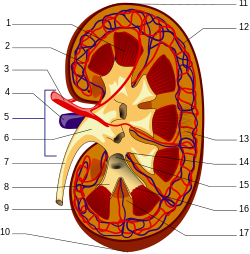Nephrology

A human kidney (click on image for description).
|
|
| System | Urinary |
|---|---|
| Significant diseases | Hypertension, Kidney cancer |
| Significant tests | Kidney biopsy, Urinalysis |
| Specialist | Nephrologist |
Nephrology (from Greek nephros "kidney", combined with the suffix -logy, "the study of") is a specialty of medicine and pediatrics that concerns itself with the study of normal kidney function, kidney problems, the treatment of kidney problems and renal replacement therapy (dialysis and kidney transplantation). Systemic conditions that affect the kidneys (such as diabetes and autoimmune disease) and systemic problems that occur as a result of kidney problems (such as renal osteodystrophy and hypertension) are also studied in nephrology. A physician who has undertaken additional training to become an expert in nephrology may call themselves a nephrologist or renal physician.
The term "nephrology" was first used in about 1960. Before then, the specialty was usually referred to as "kidney medicine."
Nephrology concerns the diagnosis and treatment of kidney diseases, including electrolyte disturbances and hypertension, and the care of those requiring renal replacement therapy, including dialysis and renal transplant patients. Many diseases affecting the kidney are systemic disorders not limited to the organ itself, and may require special treatment. Examples include acquired conditions such as systemic vasculitides (e.g. ANCA vasculitis) and autoimmune diseases (e.g., lupus), as well as congenital or genetic conditions such as polycystic kidney disease.
...
Wikipedia
